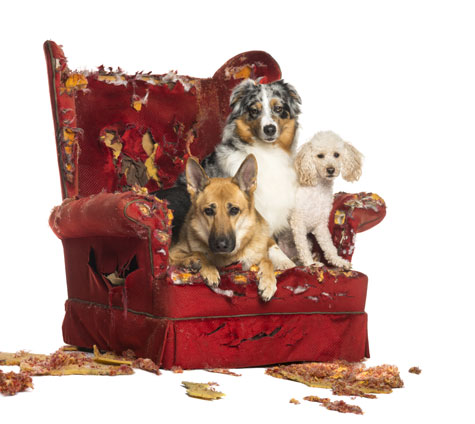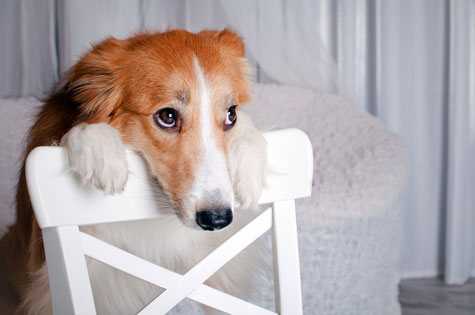Help! My Dog Has Separation Anxiety
Posted by Hot Dog Collars on 03/13/17 9:29 AM
You put on your shoes, grab your keys, and make your way to the door.
Before you can even turn the knob, your dog appears. He begins whining,
yipping, and frantically circling your feet. Your heart sinks, and your
emotions waffle between frustration and guilt.
It's a common scene, played out in households across the world. Your
dog, like thousands of others, is suffering from separation anxiety. It occurs
when a dog experiences severe distress when separated from his guardian. He may
bark, whine, howl, and use the bathroom inside. In the most severe cases, he
may destroy furniture, doors, window treatments, and other household items.
 Separation anxiety is stressful for both dogs and their owners. Severe
cases resulting in the destruction of property create household tension and may
cause financial strain. Less severe cases aren't as traumatic but can
still create chaos.
Separation anxiety is stressful for both dogs and their owners. Severe
cases resulting in the destruction of property create household tension and may
cause financial strain. Less severe cases aren't as traumatic but can
still create chaos.
The good news is that most dogs can be successfully treated. It takes
patience, but you can train your dog to handle separation from you. The amount
of time it takes to for him to respond to training will depend on his
personality and the severity of his anxiety.
Causes
Temperament and breed
A dog's temperament greatly influences whether or not he develops
separation anxiety; it's seen less in relaxed, easy-going dogs than in their
excitable, high-energy counterparts. Certain breeds, such as Dachshunds and
Cocker Spaniels, seem to have a greater inclination towards separation anxiety,
suggesting that it has a genetic component, and male dogs seem to suffer from
it in greater numbers than females.
History
Some anecdotal evidence suggests that dogs adopted from animal shelters
and purchased at pet stores are more likely to develop it than dogs adopted
from families. This is probably the result of time spent in cages without
enough human contact. This isn't a reason to avoid shelter animals. In fact, it
makes it even more important to adopt them.
Change in routine
If a dog is accustomed to spending most of his time with his owner, he
might experience separation anxiety if that changes. For example, some dogs
become anxious when their kids return to school after summer break. This is
normal and usually mild but sometimes morphs into a bigger problem.
Minor versus severe separation anxiety
Minor separation anxiety is relatively easy to treat. It may include
your dog barking, howling, and panting, but not causing huge household
disruption. He might chew up a few shoes, but he doesn't create major damage.
It's more of an annoyance than a problem.
Severe separation anxiety takes longer to treat. If may include your dog
urinating and defecating inside, barking and howling incessantly, and
destroying household items. It causes a major upset.
Treating minor separation anxiety
You can probably resolve a mild case quickly by making a few tweaks to
your daily routine.
Coming and going
 Leave quickly and quietly. Don't reinforce his behavior by petting him,
but give him a simple cue that lets him know you're coming back.
Leave quickly and quietly. Don't reinforce his behavior by petting him,
but give him a simple cue that lets him know you're coming back.
Desensitize him to your leaving routine. For example, pick up your keys,
then place them on the kitchen table. Put on your shoes, then go sit outside
with him. He'll learn that shoes and keys don't always mean you're leaving, and
he'll become desensitized to those objects.
Don't pay attention to him for several minutes after arriving at home.
If you're excited and animated when you walk in the door, he'll attach too much
importance to your arrival. It's hard, but waiting just five or ten minutes
before playing with him will help him separate from you more easily.
When you make coming and going a normal, uneventful part of the day,
he'll stop feeling threatened by your absence.
Scent
Give your dog something that smells like you, such as the shirt you
slept in the night before, while you're gone. Put it in his dog bed, and the
scent will comfort him.
Exercise
Take him on daily walks. They'll help with boredom and allow him to
expend some energy. Sometimes a daily walk is all it takes to cure minor
separation anxiety.
Treating severe separation anxiety
To treat a more severe case, do everything listed above as well as the
following, more aggressive, steps.
Safe zone
Establish a safe zone. This is a place that allows you to limit the
amount of destruction while helping him feel more secure. Put him in a room,
with a window if possible, and give him lots of toys. Don't forget to leave
something that smells like you.
If you have no other options, consider crating him, but be aware that
this may make his anxiety worse. The small space combined with your absence may
overwhelm him. However, some dogs do well with crates. It's up to you to
determine if it's right for your dog.
Training
Teach him to sit and stay. Once he learns, give him the commands then
leave the room for a few minutes. Gradually lengthen the amount of time you're
gone. This will help him remain calm and in control without you. Eventually,
you can give him the commands when you leave the house, but it's not a quick
process. It may take several weeks or even months.
While you're training
It may take a while to treat your dog's separation anxiety. While you're
training, there are ways to make life a little easier.
Supplements
Over-the-counter and prescription supplements may help. Talk with your
veterinarian about the best ones for your dog. They're not a great long-term
solution, but they can help tremendously when you start training.
Doggy day care
Many vets and kennels offer day care for dogs. The benefits are
two-fold. Your dog learns socialization skills and your house is safe from
destruction.
What doesn't work
While tempting, some things won't help with separation anxiety and may
even make it worse.
Punishment
Punishing your dog won't help. He's not misbehaving because he's a bad
dog. He's scared, and punishing him won't help him feel less afraid. In fact,
it may intensify his fears.
Another dog
Your dog is anxious about you leaving him. Getting another dog won't help
him with that. If you're adopting a dog because you want another pet, go for
it, but don't get one to help your dog with his anxiety.
If you try these suggestions and don't see improvement, contact a
professional dog trainer. She can help you develop and implement personalized
strategies for your dog.

